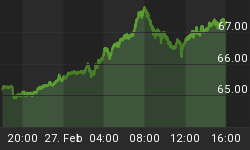Some readers have expressed puzzlement at my claim that increased consumer spending aggravated the US economy's woes. In their opinion my view not only runs against common sense but also against the current tide of economic opinion, which is true. Before going any further allow me to stress that economic growth is forgone consumption. This means that investment, spending on capital goods, can only take place by directing resources away from consumption. It therefore follows that the reverse is true. Increasing consumption at the expense of savings results in resources being redirected from investment. To avoid confusion I must elaborate further.
Increased investment expands the production structure which raises real wages and increases future consumption. Hidden within this statement is the concept of balance between savings (investment) and consumption. This concept should never be lost sight of. So long as the balance is maintained living standards will continue to rise. Credit expansion disturbs the balance and generates the business cycle. What matters for the economy, therefore, is not consumer spending but total spending. But even this, as the concept of balance states, is not enough. So long as the amount spent on investment corresponds to the country's real savings ratio balance is maintained. The problem starts when monetary policy throws this balance out of kilter. Should monetary policy result in rising consumption the effect will be to create a profits squeeze in the higher stages of production causing manufacturing to eventually contract. As Hayek put it in the The 'Paradox' of Saving (Profits, Interest and Investment, Augustus M. Kelley Publishers, 1975) , higher stages become unprofitable
not because the demand for consumption goods is too small, but on the contrary because it is too large and too urgent to render the execution of lengthy roundabout processes profitable.
In fact, even if savings were increased their beneficial effects could be more than cancelled out by an increased demand for consumer goods fuelled by an expansionary monetary policy. What this amounts to is that a rise in demand for consumption goods relative to producer goods causes much of manufacturing to contract. One should be able to easily see this if one thinks in terms of relative prices, which economists do -- until it comes to investment and consumption spending. Raising the demand for consumption goods relative to producer goods causes non-specific factors to shift to the lower stages of production, those close to the consumption stage. These factors, like all factors, are complementary, meaning that they have to be used in cooperation with other factors. Shifting non-specific factors from one line of production to another therefore sees the abandonment of specific factors, factors that only have one function.
This causes productivity to fall and excess capacity to emerge when the shift is towards consumption. Even though employment would fall in manufacturing the employment level could still be kept comparatively steady by the increased demand for labour in the lower stages of production. As this process gets underway labour costs in the economy rise even as manufacturing employment falls. This is the final stage of the boom. Now the final stage was so well documented in the nineteenth century that Marx used the phenomenon in his attack on underconsumptionists, those who argued that increased consumer spending would avert depression.
Economics has now advanced to the stage that arguments that were rightly rejected by the classical economists, of whom Marx was one, are now unthinkingly treated as a fundamental economic truth, particularly by media commentators. This explains why the first Bush tax cuts did not have any effect on manufacturing while the 2003 cuts in capital gains taxes saw manufacturing quickly pick up steam. By cutting capital gains -- which are really profits -- Bush lifted a huge burden off production by generating additional savings. It is my opinion that these tax cuts are what spurred the economy. Therefore they gave the US economy something it sorely needed -- more investment.
The effect of policies that continuously direct economic activity to increased consumption at the expense of production is to reduce the pool of savings which in turn causes the production structure to shrink. The long term consequences for living standards if such trends continued should be self-evident. We are left with the conclusion that encouraging consumption during a recession will only deepen it and prolong its duration. Now every mainstream Australian economist would vigorously deny this proposition. Funnily enough none of them appear prepared to defend their opinions.















